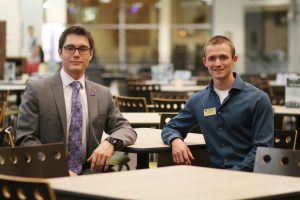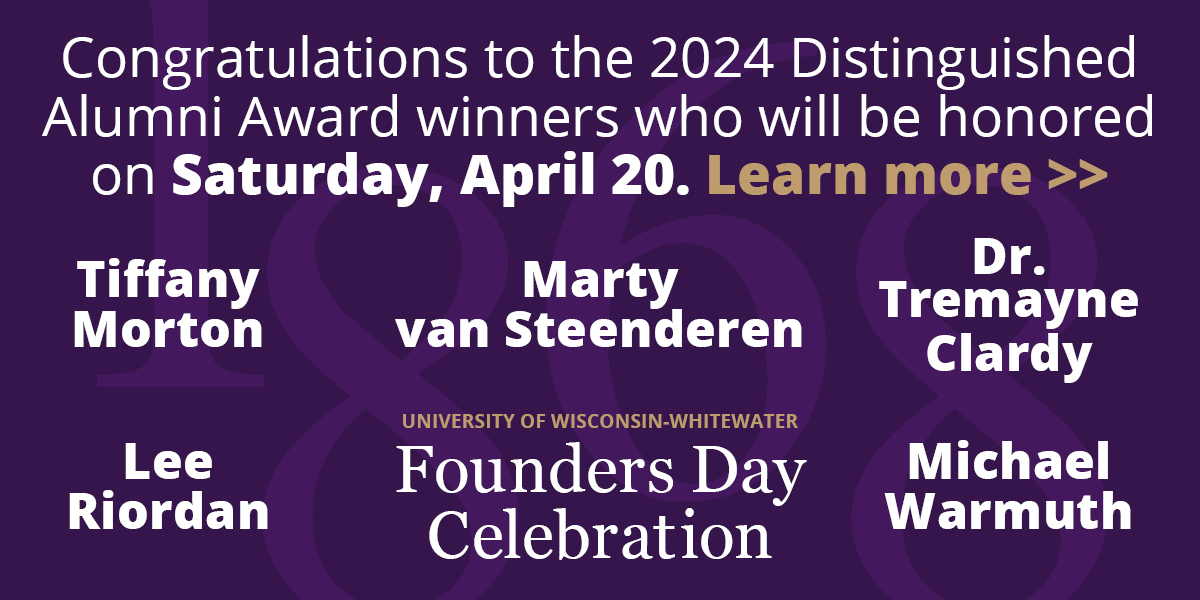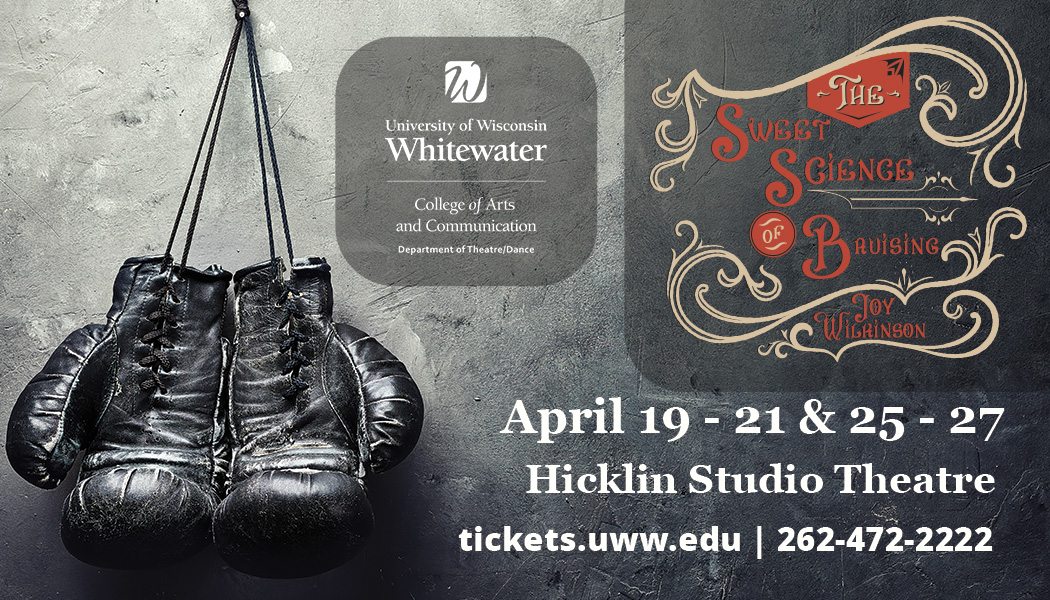
By Kimberly Wethal
April 20, 2016
One vote.
That’s all it took for senior David Kroeze and sophomore Kane Poad to win the position of president and vice president elect for Whitewater Student Government (WSG) during the 2016-2017 academic year.
They won 363-362 over the slate of senior Sen. Noah Rusch and freshman Public Relations Director Tom Kind, according to the WSG news release presenting thee unofficial results.
The April 15 news release miscalculated the two slates’ vote count, recording the total for each as 362 to 360.
The news release reported Rusch and Kind winning the Esker District on the east side of campus with a total of 124 to Kroeze and Poad’s 71, but credited the winning slate with victories in the Drumlin and off-campus districts with 126-106 and 166-132, respectively.
The unofficial results were determined at the ballot meeting following a violation hearing, where Kroeze and Poad had five offenses brought against them.
Those violations included the uses of the UW-Whitewater and WSG logos and employee guidelines.
All five violations brought against Kroeze and Poad were dismissed, they said, because of how they had researched the rules at the start of their campaign, bringing evidence of no wrongdoing with them to the hearing.
“Every year there’s a campaign where you go, ‘oh, that’s what that rule means,’” Poad said. “The [rules] can be viewed in different ways, but that’s why we have the whole process.”
The WSG presidential elections were held on Tuesday and Wednesday of last week through the university’s Connect UW-W site.
The results became official at Monday night’s weekly WSG meeting, with the senate approving the results by a vote of 15-4-2.
Rusch expressed his concern with his right to appeal before WSG’s vote on making the presidential and vice presidential elect official before the original motion was passed. His concern was centered around the standing rule, which could be interpreted to mean he couldn’t file an appeal the decision because the appeals hearing was held on Friday instead of Thursday, missing the 2 p.m. deadline to file their appeals, Rusch said.
Rusch and Kind will still be able to appeal the decision made by WSG senators during next week’s meeting.
The motion made by Sen. Anna Young to postpone the approval of the election results failed by a vote of 8-12-1.
WSG President Allison Hetz disagreed with the motion to postpone, saying with E-board positions need to be applied for by April 22, and tabling the motion would have prevented those E-board application process from being started for the upcoming semester, Hetz said, adding if the election results were left unapproved by the end of the semester, thousands of students would be left without representation.
The four candidates campaigned for a month and held a debate two weeks ago to discuss their positions on campus issues and policies.
Two of those platforms the Kroeze-Poad slate saw as priorities in their campaign were campus safety and connecting with other students.
They planned on continuing to contribute to the campus on those issues, no matter if they won or lost.
“Even if we didn’t win, we would strive to serve students any way we can,” Poad said. “We knew that even if we didn’t win, we could still make a difference.”
The decision to run
The Kroeze-Poad slate was formed in a hotel room while visiting the UW-Stout campus.
They shared the room and got to talking about the changes and improvements they wanted to see happen on campus.
It was then they realized they could work together in the roles of president and vice president.
“Suddenly the idea just floated out there, that ‘hey, we’d make a pretty good team,’” Kroeze said. “That kernel of an idea just blossomed then into this idea that we should run, and that we should do something.”
Much of the “bread and butter” of their campaign was going around to different student organizations to engage other students in the democratic process, they said.
“It’s not something we were used to,” Kroeze said. “We had to learn to campaign as we went along.”
Kroeze and Poad didn’t launch their campaign because of a love of politics or for a line on their resumes.
Instead, their desire to run came from a want to serve the campus community – seeing WSG as the best way to do it.
“We were running for a larger purpose,” Kroeze said. “When things got hard, if we saw that we weren’t doing as well in one aspect or another, we kept saying we had the right reasons driving us forward: not a desire for the position, but a desire to serve.”
Poad sees WSG as a way to serve the highest number of students he possibly can.
“It’s an organization where it’s sole purpose is to create change, and to represent the most students possible,” Poad said. “Any student can change anything they want to, as long as they have enough people to do it. WSG already has those connections with administration and can help make these changes as quickly and efficiently as possible.”
Consistent student voices
Creating a safe campus for all students was Kroeze and Poad’s main priority at the presidential debate two weeks ago, as campus climate talks sparked by Snapchat posts – one of students in dark face masks, the other of a student struggling with a wheelchair in the winter weather – had recently come full circle through a series of forums discussing short- and long-term plans to improve relations.
That priority hasn’t budged following their win.
“[The issue of a safe campus] crosses all boundaries, regardless of sex, of gender, of race, of ability, of veteran status; having students feel safe should be priority number one,” Kroeze said. “When these different groups, these different cultures, bring forth concerns, the kernel at the center is that ‘we don’t feel safe.’ So really, that’s the biggest thing we want to address and implement immediately, because everything else kind of falls to the wayside if we have students that are scared to go to class.”
Other priorities include taking care of equipment and facilities on campus that have fallen into disrepair and aren’t working properly, transparency in student services and connecting with other student organizations by attending their meetings.
Poad said the way to fix the problem is to not let the awareness of campus climate issues go away, stating the campus needs a “consistent voice” in sharing their experiences, so WSG be a leader who can help delegate situations to the right people.
“First, we need to hear what the students are saying, what they think and what their concerns are,” Poad said. “Then, we need to bring those issues to the levels that can handle it, or to those whose sole purpose is to handle those kind of things.”
There’s going to have to be more than one solution to campus climate and safety issues on campus, they said – it’ll take better communication between campus organizations and an emphasis on timely intervention on informing the student body when situations occur.
WSG also needs to focus on helping to educate the student body about campus climate issues, Kroeze said, because it’s “disheartening” to think students think the issues are overblown.
“When half of the population isn’t aware that there’s a problem, then of course it’s going to be more difficult to address,” Kroeze said. “Are we having discussions on things when they happen, or are we waiting three, four weeks before someone finally gets around to talking about how we can change things?”
Poad said the fact some students feel these situations involving hate and bias on campus to the point where it can feel over-exaggerated is why these issues matter.
“They’d have nothing to say about it being overblown if they didn’t hear about it,” Poad said. “These students wouldn’t be saying anything if it wasn’t an issue to them.”












